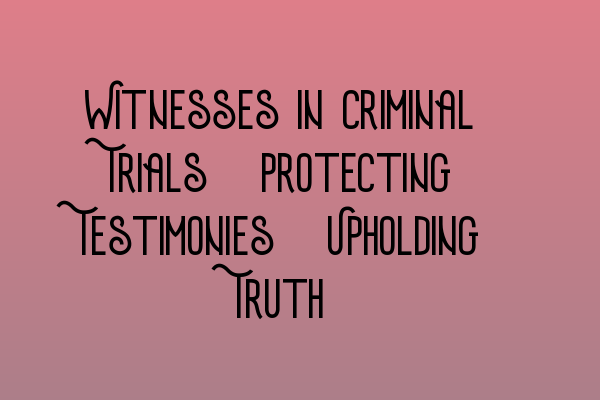***Witnesses in Criminal Trials: Protecting Testimonies, Upholding Truth***
Welcome to the SQE Criminal Law & Practice Law UK blog! In today’s post, we’ll be discussing an essential aspect of criminal trials – witnesses. Witnesses play a crucial role in the pursuit of justice, as their testimonies help uncover the truth and determine the guilt or innocence of the accused. Our aim is to shed light on how witness protection and credibility are upheld in criminal trials.
Before we dive deeper into the subject, if you’re preparing for the SQE exams, we highly recommend checking out our related resources:
– [SQE 1 Practice Exam Questions](https://fqps.co.uk/sqe/sqe1-preparation/mcq-practice-quiz)
– [SQE 1 Practice Mocks FLK1 FLK2](https://fqps.co.uk/sqe/sqe1-preparation/practice-mocks-quiz)
– [SQE 2 Preparation Courses](https://fqps.co.uk/sqe/sqe2-preparation)
– [SQE 1 Preparation Courses](https://fqps.co.uk/sqe/sqe1-preparation)
– [SRA SQE Exam Dates](https://fqps.co.uk/sqe/sqe1-sqe2-exam-dates)
Now, let’s delve into the world of witnesses in criminal trials.
**Role of Witnesses**
Witnesses are individuals who possess relevant information regarding a criminal offense. They can be victims, bystanders, or individuals with expertise in a particular field. Their testimonies and accounts serve as crucial evidence for the prosecution or defense.
Witnesses have a responsibility to share accurate and truthful information about what they witnessed. However, their willingness to come forward and cooperate can be hindered by fear, intimidation, or pressure. Therefore, it is essential to protect witnesses and create an environment that encourages them to share their testimonies without fear of reprisal.
**Witness Protection**
The legal system recognizes the need to safeguard witnesses from potential harm or interference. Witness protection programs are designed to ensure the safety and security of these individuals.
In these programs, witnesses may be relocated, their identities may be concealed, and necessary security measures are implemented. By providing this protection, witnesses can provide their testimonies without fear for their own or their loved ones’ safety.
**Credibility of Witnesses**
The credibility of witnesses is a crucial factor in any criminal trial. Their testimonies must be credible, reliable, and free from any form of manipulation or bias. Assessing the credibility of witnesses involves evaluating factors such as their demeanor, consistency in statements, character, and any potential motives for providing false information.
Cross-examination by the opposing counsel is an essential part of establishing the credibility of witnesses. It allows for the exploration of inconsistencies, biases, and other factors that may affect the witness’s reliability.
**Challenges and Controversies**
While witness protection and credibility are vital, challenges and controversies can arise. Some witnesses may be reluctant to testify due to their own involvement in illegal activities. Others may be coerced or incentivized to provide false testimonies. These challenges present significant obstacles for criminal justice professionals striving to uncover the truth.
In recent years, advances in forensic science and technology have also raised questions about the reliability of eyewitness testimonies. Research has shown that memory can be fallible and influenced by various factors. This highlights the need for a comprehensive approach to gathering evidence that goes beyond solely relying on witness testimonies.
**Conclusion**
Witnesses play a critical role in criminal trials, bringing forth important information that can help determine the outcome of cases. Upholding the truth and protecting witnesses are integral to ensuring a fair and just legal process.
If you’re interested in learning more about criminal law and practice or preparing for the SQE exams, be sure to explore our [SQE 2 preparation courses](https://fqps.co.uk/sqe/sqe2-preparation) and [SQE 1 preparation courses](https://fqps.co.uk/sqe/sqe1-preparation).
Thank you for reading! Stay tuned for more informative articles about criminal law and practice.
